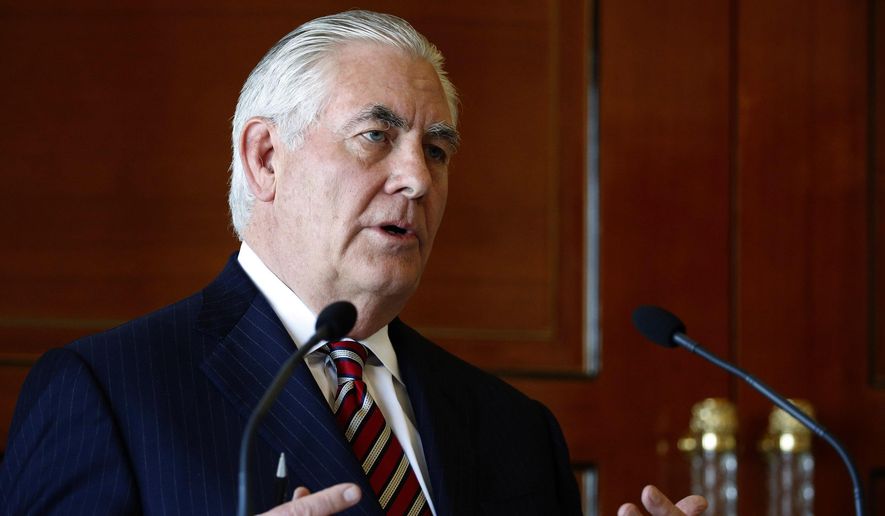OPINION:
President Trump’s firing Secretary of State Rex Tillerson was crude, rude and way overdue.
The president, not the president’s chief of staff, should have been the first to inform Mr. Tillerson personally and in private, that he is getting the heave-ho. Mr. Trump should have let him have time to prepare his own face-saving announcement.
But more important, the former ExxonMobil chairman should never have agreed to serve in this administration in the first place, given his dislike of so much of what Mr. Trump ran on.
And given Mr. Tillerson’s inability to subordinate his views to those of his boss, the only one of the two whom Americans elected to conduct foreign policy. The president appointed Mr. Tillerson to carry out the president’s foreign policy, not Mr. Tillerson’s.
It’s astounding that the former CEO of world’s biggest oil company doesn’t understand the constitutional role of a secretary of state. The only policy role of the occupant of that office is to offer his own policy advice to the president, in private, and then carry out whatever the president decides without mumbles, grumbles or winces.
Why?
For the sake of the American government’s credibility, abroad and at home. The only reason foreign governments pay any attention to the U.S. secretary of state is that they are convinced he speaks for the president.
That belief faltered almost immediately.
As a candidate, Mr. Trump made it clear to all but the terminally stupid that he would tear up the Iran nuclear deal if elected.
Once sworn in, Mr. Tillerson committed the unforgivable sin of publicly disagreeing with Mr. Trump on this. “He and I have differences of views on things like [the Iran deal] and how we should use it,” Mr. Tillerson said.
Mr. Trump was unwise to appoint a man so at odds with the president on so important an issue, but Mr. Tillerson had no excuse for disputing his boss publicly. That moment would have been a good time for Mr. Trump to whisper “you’re fired.”
The belief that the State Department speaks for the president also faltered after four Arab countries severed relations with a fifth, Qatar, for its funding terrorism, Mr. Tillerson urged all five to settle differences in order to get on with the fight against terrorism. Mr. Trump sided publicly with the four against Qatar. This was not a good-bad cop tactic but sloppy message coordination by the administration.
You can’t have the secretary of state and the president publicly disagreeing. It diminished the seriousness with which foreign governments take the pronouncements, policy statements and, yes, the threats uttered by U.S. government.
In this case, Mr. Trump should have cooled his twitter finger. He should have quietly persuaded Mr. Tillerson to resort to diplo-speak to establish in subsequent statements that he really agrees with Mr. Trump and always has on Qatar. Either that or resign.
The fault lies, unequally, with both men. Mr. Tillerson should have cleared his Qatar view with Mr. Trump before going public. Mr. Trump should have resolved the situation privately with Mr. Tillerson.
Last summer, Mr. Trump yanked the U.S. out of the Obama-approved Paris climate accord. Mr. Tillerson publicly disagreed.
A secretary of state less full of himself would have resigned. A president less loath to pull the trigger would have eased Mr. Tillerson back into private life right then and there.
Again last summer, Mr. Trump said of the Afghanistan war, “Our troops will fight to win. We will fight to win. From now on, victory will have a clear definition: attacking our enemies, obliterating ISIS, crushing Al Qaeda, preventing the Taliban from taking over Afghanistan, and stopping mass terror attacks against America before they emerge.”
Mr. Tillerson addressed the Taliban this way: “You will not win a battlefield victory. We may not win one, but neither will you. So at some point, we have to come to the negotiating table and find a way to bring this to an end.”
Nothing wrong with the Tillerson statement — if he had the common sense to have uttered it privately and solely to Mr. Trump.
Mr. Tillerson never revealed such common sense. He ultimately got what common sense said he had coming.




Please read our comment policy before commenting.